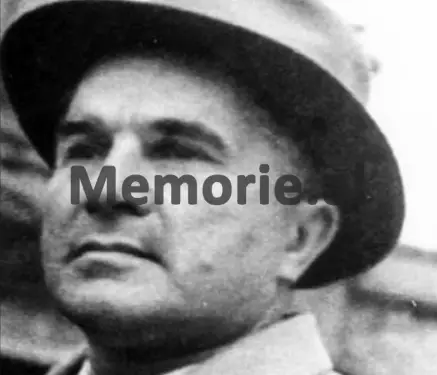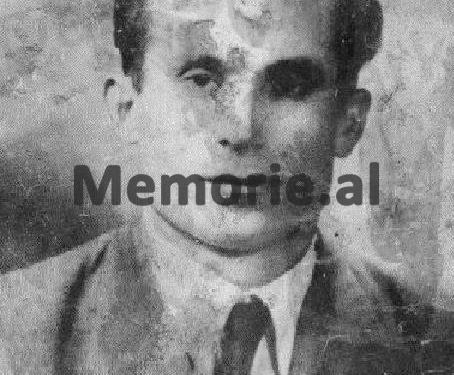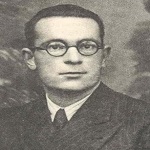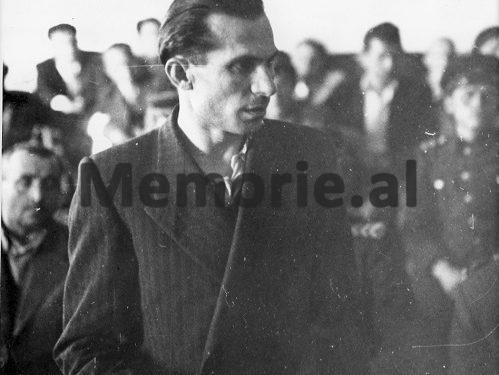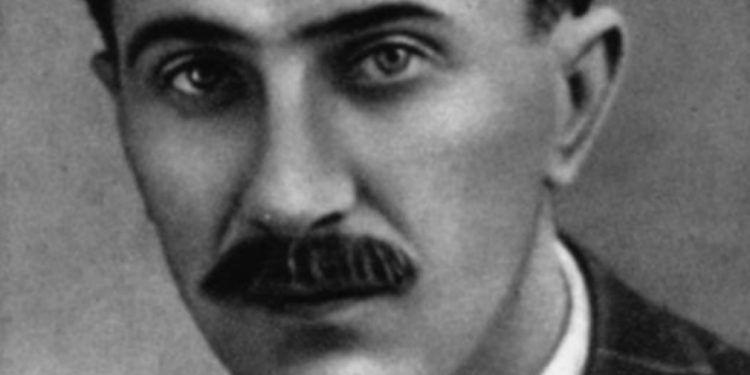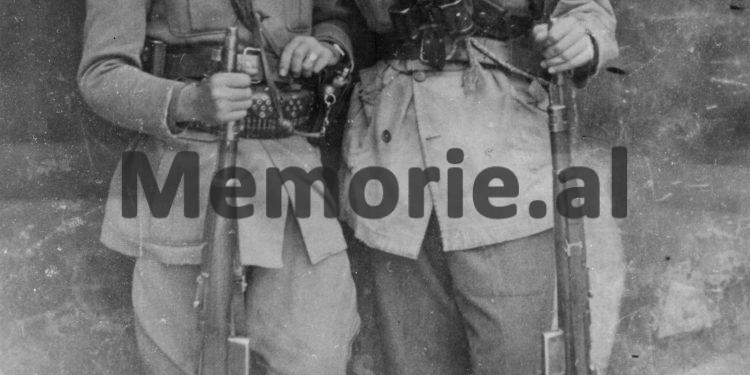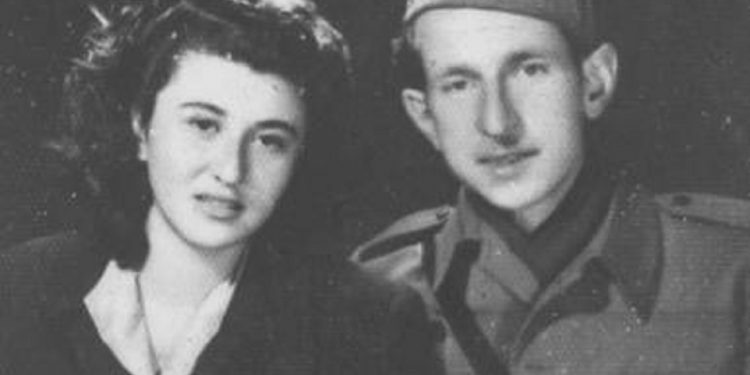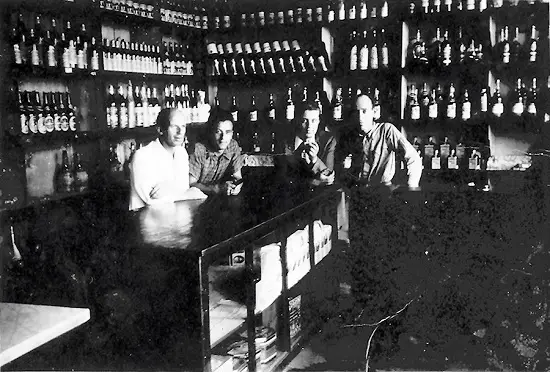By Gjergj Titani
The sixth part
Memorie.al / For the first time, we have been able to provide the witness account of many historical events. The conversation with Pandi Kristo, a senior figure of the Communist Party of Albania and the Albanian state, took place in Tirana, in the house of his son-in-law, Robert Vullkani, where he was forced to live, when he was released from exile, since the Albanian democratic state, never gave him a home. The regime, for which he fought, targeted him to liquidate Pandi Kristo, placing him in the group of Koçi Xoxes, convicted for “hostile activities”. For 42 years in a row, I would wander the prisons of the communist dictatorship and successive exiles, until communism was overthrown forever, at the beginning of the 90s. The interview was conducted in 1992 – 1993 and over the years, it was completed, according to the memories and family archive of Pandi’s daughter, Assembly Kristo (Vullkani), sister, veteran of the Anti-Fascist National Liberation War, his son-in-law, Robert Vullkani, and the memories of many contemporaries. Here is Pandi Kristo’s confession.
Continues from the previous issue
Mr. Kristo, you have been convicted as a member of the Koçi Xoxes group, can you clarify your acquaintance with him?
I remember that in 1930, I met Barba Dhimitri (Dhimitër Xoxe), the father of Koçi Xoxe, quite by chance. He had bought a shop next to the shop of the Peristeri brothers, which was located in front of the shops of the Plaha brotherhood, where today is the passenger transport company to Greece. At that time, the barba Dhimitri had just arrived from Negovani (today this village is called Flamburo and is inhabited by Albanian speakers), which is located about 17-18 kilometers from the Prefecture of Follorina. Personally, Koci Xoxen, who was about three years older than me, seems to have been born in 1911, I met him shortly after his father’s job in Korça. Coincidence brought our meeting, in one of the usual picnics we organized with the youth of Korça, in climatic and tourist spots of the province.
Koçi constantly organized such picnics in Dardë, Morava, Saint Naum, Voskopoja, Saint Marena of Pogradec, Saint Trivac of Hočishti, etc. In them, the working and student youth of Korça gathered and, during the meeting, they talked about patriotic topics and at the same time, skits and small concerts with patriotic songs were organized. I remember that, at the end of these picnics, we handed over brochures with progressive and communist ideas to the students, who were constant participants of these activities. When the magazine “Bota e Re”, which was our publication, came out, we distributed it, also collecting contributions for its publication. In these activities, I remember that many friends participated who accepted our ideas.
It would be of great interest to the reader to tell how and under what circumstances the ‘Bread Demonstration’ was organized and developed. How did you experience the tense situation that was created in Korça?
In 1936, as the leader of the group, we decided to rise up the people of Korça and its surroundings, on a Saturday shopping day, in a mass protest, known as the ‘Bread Demonstration’. As a result of the great world economic depression, we took advantage of the extreme poverty of the urban and rural population for a mass revolt of vast proportions. We propagated among the artisan owners, of all kinds, to close their shops on that day and hand over the keys to the municipality. The revolt was started by the citizens of Korca, supporters of the Communist Group of Korca, and was widely supported by students and villagers who had come to shop.
The demonstration started successfully, the workers of the city and the villagers supported us massively, holding in their hands the traditional flags of the professions. The shoemakers, tailors, iron workers, tinsmiths, various technicians, drivers, carpenters, apprentices and waiters, first went to the city hall and after the first banners, the commander of the District Gendarmerie at that time, Colonel Deda Jakova, according to the order and the reinforcements he had received from Tirana, unleashed the armed gendarmerie against the peaceful demonstrators. This was the first major organized clash of the civic workshop and Korčari students, against the local government and the Royal Gendarmerie.
The workers were bloodied, mass arrests were made and as a result, our demonstration was broken up, but we came out of this fight even stronger. In the city, in those days, gendarmes were circulating in patrols of three and had blocked all the roads leading to Pogradec, Bilisht, Kolonje, Voskopoja, Dardha, etc. So, this was a good experience, as we learned how to organize popular revolts in the future, because the local government elections were also approaching.
How did the Communists win the Municipal Council elections?
The local elections for the City Council of the city were approaching. We had decided to organize the propaganda of our candidates who for the first time would face the official candidates of other forces. Korça, at that time, had a well-organized workforce in their unions, according to professions and school age. We were preparing so that, in addition to the victory in the local government, we would also have our representatives in the Parliament. As a result of this good organization, of the cores and cells of the Communist Group of Korça, disguising the communist cells, under the name of the society “Puna”, we won the elections of the Municipal Council and our friend Communist Group of Korça, Koçi Xoxe.
So, using all the legal spaces allowed by the Royal Constitution, we did our best to gain the rights that were due to us by law. I want to emphasize that the Communist Group of Korça was never activated in terrorist activities. As far as I remember, we could be criticized for self-contained activity or, for being clumsy for mass actions and a wider and deeper exit, from the framework of the Korca District, but we thought then that it would be better to be more slowly in those circumstances of social oppression and lack of timely preparation of class consciousness, rather than rushing into political and propaganda activities, and then suffering defeats. The echo of the “Bread Demonstration” and the victory of the local elections were very big, not only in Korça District, but also beyond. The foundations of the struggle and the organized efforts of the working class and the broad popular strata of the city and the countryside were being laid.
In 1939, you were convicted of communist activities by the Albanian Royal Court, what do you remember from that time?
The trial against the communists, which took place at the beginning of 1939, in Tirana, was the first political trial of that magnitude. The Albanian Royal Government and its policy was directed towards taking calming measures against the elements, which it unfairly called disturbing elements, which in fact was not the case. Zogu, the first, felt an imminent invasion of Albania by fascist Italy. He sensed imminent danger as he brought about his overthrow and the departure of the Bird of the Royal Court into an exile that would last for many, many years. At that time, by order of the Communist Group of Korça, I was working in Tirana, in the “Zik-Zak” workshop, owned by our friend Gaqo Kondakçi, from Korça. In this workshop, I was sent to replace Sotir Vulkani.
Necessarily, we, a core of veterans of the Communist Group of Korça, had settled in the capital, for three major reasons; to spread communist ideas, to expand the war against the occupier, which had already begun in a large scale, and to lay the foundations for the unification of Communist Groups and the creation of the NPSH. I remember that, like Sotir Vullkani, I lived in the house of Dhori Karagjozi, a staunch communist and anti-fascist, who had turned his house into an important base of the Communist Group of Korça. (His daughter, Lidra, is today married to the teacher of the state university of Tirana, Rexhep Meidani. And the other daughter is married to the son of Hysni Kapo).
When the mass arrests of the Communist Group of Shkodra were carried out, we were arrested together with Sotir. With the help of the former Minister of Justice, lawyer and deputy of that time, Thoma Orollogai, he was acquitted of the charges against him, while I was tried and sentenced together with the members of the Communist Group of Korça, such as; Zef Mala, Vasil Shanto, Qemal Stafa, Niko Xoxi, Ilo Panduku, Emin Duraku, Tuk Jakova, Jorgji Shuteriqi and others. A little later we were transferred to the prison of Mbrezhdan, Berat, where we were also found by the collapse of the Monarchist state, after the fascist invasion of the country, on April 7, 1939. Meanwhile, the functioning of the state was paralyzed after a short resistance of several days, the Royal Albanian Army and the popular self-defense forces put an end to the resistance.
The king, senior officers of the Army and the Gendarmerie, together with other supporters of the Zogist government, ministers, deputies, and other high-ranking personalities, who, according to the data, were about 2,000-3,000 people, were deployed, not without difficulties, first in the nearest Greek border town of Follorina and then in Larissa. Meanwhile, we blew up the prison and decided to escape. Most of the prisoners escaped abroad, and I immediately decided to make connections with my friends in the city of Korça, so I hurried to go there. After I urgently returned to Korça, those days of April 1939, I met Sotir Vullkani with Koço Tashko, who I found very worried about the defense of the city that was left without local government and without military protection.
They told me that they had met Enver Hoxha by chance in a bar in Korça, who had told them that he was preparing to go to Romania, to receive the “fees”, for some articles that he had written in the newspapers of Bucharest and Constance! This fact or fiction of Enver has constantly put me in doubt, because if he had really written something like this, he would not have left it unmentioned in his “voluminous works”. So, neither these articles nor the ones he claims to have written in the newspaper of the French Communist Party, “Hymanite”, have ever been verified. We were wondering what Enver’s fiction was, in those difficult days?!
I remember well when Koço Tashkoja said to Miha Lakos and me: “…Activate this professor in some work…”! We looked at each other in amazement and Miha said: “…Leave us alone, Koço, with this entire professor…”! I want to emphasize that all of us, the communists of Korça, had no respect for him. They even suspected Enver Hoxha of some insincere actions and statements. In those days, we were very worried about the fate of our country and our city, while Enveri had the mind to go to Constanta and Bucharest for some money.
How was the situation in the city of Korça in the first days of the fascist occupation?
First, I knew that the comrades of the Group had taken all the measures to welcome the fascist invasion as it deserved, with popular, anti-fascist revolts and demonstrations. The fascist invasion, as a result of the weak resistance of the Royal Army, advanced relatively quickly. The Commander of the District Gendarmerie, Colonel Preng Pervizi, although he enjoyed some popularity in Korça, did not act energetically, because there was no such official order from the King. I think that the District of Korça, Skrapar and its other highlands were the most suitable place to start a genuine popular resistance, which did not happen for many subjective reasons of the military staff of the Royal Albanian Army. I want to emphasize that my friends told me that the King was careful about himself and the people who accompanied him, so he did not stop in Korça, but at his loyalists, in the village of Zemblak.
Koço Tashkoja and Koçi Xoxja told me, when we met, that they had organized an ambush for the King, to prevent him from leaving Albania, but he had shown himself to be cunning, because he had not followed the national highway, Pogradec-Maliq-Korçë, but the secondary road: Pogradec-Zemblak-Bilisht-Kapshtice. He, after having slept one night in Zemblak and having met Colonel Preng Pervizi, the commander of the District Gendarmerie, separated from them. (Of course, I have these data from the secret materials of the intelligence department when I took office in the new Democratic Government of Berat). The people of Korça and Pogradec, Bilishti, Erseka, Leskovik and the villages, welcomed the entry of fascist troops, with indignation, revolt and massive anti-fascist demonstrations.
Those days, the people of Korça, according to tradition, came out with the national flag and anti-occupation slogans in their hands, singing the patriotic songs “For the Motherland”. I have seen with my own eyes how the old patriots, friends of Mihal Gramenos, Themistokli Gërmenji, Petro Nini Luarasi, Papa Kristo Negovani, Spiro Ballkameni, etc., came out in demonstrations, together with the young people and with tears in their eyes expressed the indignation of theirs against the invasion. These were the first steps in the organization of the anti-fascist resistance and the struggle for the creation of the NPSH. It is precisely this time, when the most experienced comrades of the Communist Group of Korça were sent to different cities of Albania, for the expansion of the anti-fascist resistance under the leadership of the Albanian Communist Party, which was on the threshold of its establishment.
What is your family background?
My father, Kristo Gusho, because we actually had this last name, was a shoemaker, but he also performed other professions. In short, what could he do, because with his salary, he had to support his family and feed six children, 4 girls and two boys? My godfather, I say this proudly, was the famous professor Spiro Konda, from Dardha e Korça. The father was connected to Mihal Grameno’s patriotic gang. I remember that he died at the age of 74, in the 30s, when I was quite old. My mother, Polikseni, was forced to work as a cook, a midwife, in rich families, but she also washed clothes, dyed and did other jobs. In these severe economic conditions, I mean that I was forced to leave school and learn self-taught, because I already had to work instead of my father, to support and send all my sisters and brother to school.
I started working as a shoemaker’s apprentice in the shop of Sotir Vulkani, which was close to the Church of the Metropolis of Korça. We lived near Dr. Harisjad, who had graduated from Alexandria, Egypt. His brother, Petro Harisi, wrote the very valuable book, “Historia e Korça”. I want to add that Dr. Harisjadhi was the first cousin of Sotir Vulkani, who had an uncle, the famous captain Makriu, who was killed around 1911, in Ioannina, in a battle with the Turks led by Xhavit Pasha. In these battles, which were crowned with success, defeating Xhavit Pasha and expelling him from Ioannina, many Albanians from the south, especially from Korça, participated. Maybe I took a little longer with these explanations, but I did this with the intention of explaining Dr. Harisiadhi’s position in the Italo-Greek war.
When the Italians brought to Korça, numerous troops to get ready for the war in question, they called to a large meeting, all the leaders of the city: priests, monks, Bektashi fathers and from the intellectual layer of the country, in order to made a statement in favor of fascist Italy, Dr. Harisjadhi was the only one who did not sign such a shameful statement. Addressing the participants, he asks: “If the Greeks return as winners of this war, which has nothing to do with us Albanians, what will you do”?! Of course, this question of the doctor does not need comments. He left in Greece, to the people of his tribe, Albanians living there, and returned to Korça, before its liberation from the foreign invaders. That same day, he died. It is implied that Dr. Harisjadhi was Philo-Greek, but not Greco-Roman. He was definitely an Albanian patriot. Memorie.al
The next issue follows




